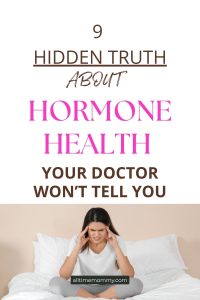Uncover 9 hidden truths about hormone health every woman should know—insights your doctor won’t tell you but your body needs you to hear.
When it comes to women’s health, hormones are everything. Yes, sis, Research suggests that hormones influence your mood, energy, sleep, skin, weight, menstrual cycle, fertility, and more.
But despite their massive impact, hormone health is often misunderstood, oversimplified, or brushed off—especially in routine medical visits.
So what aren’t you being told?
Here are nine things every woman should know about her hormones, whether you’re in your 20s or navigating menopause.
9 Truth No One Tells You About Hormonal Health (But Every Woman Should Know)
1. Menopause Isn’t the Only Time Hormones Matter
Yes, menopause is a significant hormonal milestone, but it’s not the only one.
Hormonal imbalances can show up at any age, from puberty to postpartum to perimenopause.
What’s more, events like starting birth control, pregnancy, miscarriage, and breastfeeding can all affect hormone levels, sometimes masking symptoms or making testing less accurate.
Many women ignore hormonal symptoms in their teens, 20s, 30s, or during pregnancy/postpartum because they assume it’s “just part of being a woman” or think hormone care only starts at menopause.
This ignorance can sometime delay action and worsens imbalances over time.
So, what is the solution?
Pay Attention to Hormonal Health at Every Life Stage
Supporting your hormones early and consistently, and not just during menopause. This helps prevent long-term issues like fertility struggles, thyroid problems, or chronic fatigue.
Here’s How to Take Action at Any Age:
Teens & Early 20s: Build a Healthy Hormonal Foundation
- Avoid normalizing extreme PMS, acne, or painful periods
- Eat whole foods (protein, fat, fiber), get regular movement, and limit sugar
- Support gut health and reduce endocrine disruptors (plastics, synthetic fragrances)
- Avoid overusing hormonal birth control without understanding the root causes
This stage is about laying the groundwork for hormone resilience.
20s & 30s: Focus on Cycle Health, Fertility & Stress Management
- Track your cycle regularly—not just for pregnancy, but for insight into overall health
- Address stress and sleep, which impact fertility hormones (progesterone, LH, FSH)
- Balance blood sugar to protect against PCOS or insulin resistance
- Consider functional lab testing if symptoms like fatigue, anxiety, or hair loss appear
This is a crucial window for preventing hormone burnout and metabolic issues.
Pregnancy & Postpartum: Recognize and Support Major Hormonal Swings
- Acknowledge that postpartum mood issues can be hormonal, not just emotional
- Eat nutrient-dense, healing foods and focus on rest
- Rebuild nutrient stores (especially iron, B12, omega-3s)
- Ask your doctor about thyroid testing post-pregnancy (risk for postpartum thyroiditis)
This phase requires nourishment and rest to re-regulate hormones.
Perimenopause (Late 30s to Late 40s): Prepare, Don’t Panic
- Track changes in mood, sleep, cycle length, and libido—these shifts are hormonal
- Start incorporating hormone-supportive habits (protein-rich meals, magnesium, adaptogens like ashwagandha)
- Ask about progesterone support if symptoms are disruptive
It’s easier to manage perimenopause when you start early, not wait for menopause.
Menopause and Beyond: Maintain Hormonal Balance
- Even after cycles stop, hormones like estrogen, cortisol, and insulin impact heart, bone, brain, and metabolic health.
- Consider menopause hormone therapy (MHT) or natural alternatives under guidance.
- Continue to prioritize gut health, muscle strength, and stress regulation.
2. Your Hormones Are Impacted by More Than Just Your Reproductive Organs
Hormones aren’t just about periods or pregnancy.
Your liver, gut, and even fat cells play a major role in hormone production and balance. So if you’re only focusing on your ovaries or thyroid, you’re missing the bigger picture.
Gut Health = Hormone Health
An imbalanced gut can affect how you metabolize estrogen, absorb nutrients, and manage inflammation. If your digestion is off, your hormones probably are too.
Your Skin is a Reflection of Your Hormones
Acne, dryness, or hyperpigmentation can signal hormonal imbalances. And no, it’s not just about “bad skin”—it’s your body trying to talk to you through your largest organ.
Take acne, for example. It’s not always about clogged pores or a bad skincare routine. Hormonal acne, especially around the chin and jawline is often driven by excess androgens (male hormones like testosterone).
This hormones increase oil production and inflammation. This is why breakouts can flare up around your period, during puberty, or with conditions like PCOS.
Dryness or flakiness?
That can be linked to low thyroid hormones or declining estrogen levels, especially during perimenopause or after pregnancy.
These hormones help regulate moisture, collagen production, and skin elasticity—when they drop, the skin can feel tight, dull, or prematurely aged.
Then there’s hyperpigmentation—like melasma or dark spots—which can be triggered by hormonal shifts, especially during pregnancy (often called the “mask of pregnancy”), birth control use, or hormonal therapies.
3. Hormonal Imbalance Isn’t Always Obvious
Think hormonal imbalance means hot flashes or significant mood swings?
Not always.
Subtle signs—like fatigue, anxiety, bloating, trouble sleeping, or weight changes—can all be hormonal. But these symptoms are also common to other issues, so they’re often dismissed or misdiagnosed.
Just because your symptoms don’t scream “hormonal” doesn’t mean they aren’t.
So what should you do?
Learn to Listen to (and Log) Your Body
Understand What “Normal” Feels Like for You
Instead of comparing yourself to others, tune into your baseline. Ask:
- Have I always had painful periods, or is this new?
- Do I feel different before my cycle starts?
- Are my energy dips or mood swings predictable—or random?
- Why am I bloating constantly?
- If you’re tired, is it anemia? Thyroid? Cortisol? Blood sugar?
- If you’re anxious, is it PMS, perimenopause, or nutrient depletion?
Subtle changes are easier to notice when you know your normal.
4. Don’t Wait for Symptoms to Become “Severe”
Many women seek help only when their symptoms are debilitating, but early intervention can make hormone rebalancing far easier.
Just because it’s common doesn’t mean it’s normal.
PMS, low libido, and cycle irregularities are worth addressing early.
But how?
Track Your Cycle Consistently
Use an app or journal to log your symptoms, mood changes, libido shifts, and cycle length. Patterns often reveal which hormones (like estrogen, progesterone, or cortisol) may be off.
Balance Blood Sugar First
Fluctuating blood sugar is one of the top hidden disruptors of hormone health. Start by reducing refined sugars, eating balanced meals (protein + fat + fiber), and avoiding long periods without food.
5. Hormone Fluctuations Are Normal
Estrogen and progesterone levels change throughout your cycle, not just during your period.
These natural shifts can impact everything from your mood to your cravings. And even if you’re not menstruating, hormones like cortisol (stress hormone), insulin (blood sugar regulator), and thyroid hormones are still hard at work.
Bottom line? Fluctuation isn’t always a sign of imbalance. Sometimes, it’s just biology doing its job.
Learn the Phases of Your Menstrual Cycle
Understanding where you are in your cycle helps explain why your energy, mood, or cravings might change.
Align Your Lifestyle with Your Hormone Shifts
When you know what’s coming, you can adjust your expectations, activities, and self-care to stay in sync with your body.
Support Hormonal Shifts, Don’t Suppress Them
Daily habits that support hormone regulation (instead of trying to force “sameness”)
6. Stress Profoundly Impacts Hormones
If your stress levels are constantly high, your hormones will feel it, primarily cortisol. Chronic stress can throw off your menstrual cycle, suppress ovulation, wreck your sleep, and even reduce your fertility.
And yet, stress management is rarely part of the hormone conversation in a doctor’s office; and that’s why meditation, better sleep hygiene, and boundary-setting matter more than most people realize.
So, what should you consider doing often?
Practice Daily Stress Relief
Choose 1–2 techniques to do consistently, not just when you’re overwhelmed:
- Deep breathing or box breathing
- 10-minute guided meditation
- Journaling or gratitude writin
- Walking in nature
- Prayer, silence, or mindfulness
Studies show even 10 minutes a day of mindfulness or breathing exercises lowers cortisol significantly.
7. There’s No Simple One Fits All “Hormone Check”
You can’t just walk into a clinic and say, “Check my hormones,” and expect a single test to give you all the answers.
Unlike checking your cholesterol or blood sugar, hormone testing is nuanced.
Hormone levels fluctuate not just monthly, but daily—sometimes hourly—depending on stress, diet, sleep, and where you are in your cycle.
Doctors often rely more on your symptoms than on numbers.
That’s because there are over 50 hormones in the human body, and testing them all wouldn’t just be impractical—it would be meaningless without clinical context.
The Realistic and Practical Solution:
Track Your Symptoms and Cycle First
Your symptoms, like fatigue, mood swings, irregular periods, weight gain, or sleep issues, are often more revealing than one-time lab results. Keeping a symptom tracker or hormone diary for at least two complete menstrual cycles can help you and your healthcare provider connect the dots.
Solution Tool: Use an app like Clue, Flo, or a printable hormone tracker to monitor patterns.
Request Targeted Testing (Not a Full Panel)
Instead of asking for “a hormone check,” work with your provider to test specific hormones based on your symptoms and cycle phase. For example:
- Irregular periods: Estrogen, progesterone, LH, FSH
- Fatigue or weight gain: Thyroid panel (TSH, Free T3, Free T4), cortisol
- PCOS suspicion: Testosterone, DHEA-S, insulin, LH/FSH ratio
Solution Tip: Hormones should be tested at the right time in your cycle (e.g., day 3 or day 21) for meaningful results.
Consider Functional Testing for Deeper Insight
If traditional blood work doesn’t explain your symptoms, ask about saliva or urine testing (like DUTCH tests), which can offer insights into cortisol patterns, estrogen metabolism, and hormone fluctuations over 24 hours.
Note: Functional testing can be costly and not covered by insurance, but it’s valuable in complex cases.
Lifestyle Review is Essential
Sometimes hormone issues aren’t about the hormones themselves, but about what’s affecting them:
- Chronic stress
- Poor sleep
- Blood sugar imbalances
- Environmental toxins
- Nutrient deficiencies
Testing Has Its Limits—Context Is Everything
When you test your hormones, it matters. Cycle day, time of day, sleep, stress, and medications can all skew results.
For women who are on birth control or breastfeeding, specific tests (like estrogen and progesterone) might not be reliable at all. Your doctor might focus more on thyroid or adrenal hormones in these cases.
Testing is a tool, not a diagnosis. What you feel matters just as much as what the lab says.
8. Medication Doesn’t Fix Everything
While having Hormone therapy or any other hormonal medication may help improve the quality of your life, research shows that its not an all in all solution..
Reviewing your lifestyle holistically is a solution that is often more impactful than medication alone. Diet, sleep, exercise, and stress management are just as important.
I mean,
Hormone health isn’t just about what’s happening inside your body—it’s also about what you’re exposed to. Diet, sleep, movement, and environmental toxins (like BPA from plastics or pesticides in food) can all disrupt hormonal balance.
Even too much high-intensity exercise or calorie restriction can negatively affect your hormones.
The key is balance: consistent, moderate activity and a nutrient-rich diet.
9. Menopausal Hormone Therapy (MHT) is NOT Only for Menopausal Women
MHT (also called HRT) is the most effective treatment for symptoms like hot flashes, night sweats, and vaginal dryness. But many women are scared off by outdated myths about weight gain or cancer risk.
In truth, Menopausal Hormone Therapy (MHT), though traditionally used to manage symptoms in menopausal women, is not limited to this group alone.
Research shows that MHT is also crucial for younger women with primary ovarian insufficiency (POI), who experience menopause-like symptoms and long-term health risks such as osteoporosis and heart disease at an early age.
Additionally, MHT-like hormone regimens are essential in gender-affirming care for transgender women, providing necessary estrogen to support physical and emotional transition.
In certain medical conditions, such as advanced prostate cancer in men, estrogen therapy—closely related to MHT—has been used to suppress testosterone and slow cancer progression.
These diverse applications demonstrate that MHT serves broader therapeutic roles beyond menopause, addressing hormonal needs across different populations and medical conditions.
Related:
How High Protein Breakfast Help Women with PCOS Regain Hormonal Balance
10.Supplements Can Gently Support Hormone Balance—But No One Tells You Which Ones
When your hormones are out of sync, doctors often jump straight to prescriptions—but there are gentle, natural ways to support your body before reaching that point. One of the least talked-about tools?
Foundational supplements that work with your body’s natural hormone rhythms.
Depending on your symptoms, here are a few supportive nutrients to consider:
B Vitamins (especially B6, B12 & Folate)
These are essential for hormone production and regulation.
-
B6 helps balance estrogen and progesterone, and has been shown to ease PMS symptoms like mood swings and irritability.
-
B12 and folate assist in liver detoxification (methylation), which helps clear excess hormone metabolites and maintain hormone balance.
Women on oral contraceptives are especially at risk of B vitamin depletion and may benefit from targeted supplementation.
Probiotics
Your gut health plays a surprising role in hormone regulation. Probiotics help restore gut flora, which can improve estrogen metabolism and reduce symptoms like bloating, acne, and fatigue.
Magnesium & Vitamin D
These nutrients are hormone heroes.
-
Magnesium calms the nervous system, eases PMS, supports sleep, and helps balance estrogen.
-
Vitamin D plays a role in everything from mood to immune function and is critical for bone health—especially in women with low estrogen levels.
Botanicals
Certain plant-based remedies have been used for generations to support hormone health:
-
Black cohosh, red clover, soy isoflavones, ashwagandha, and lemon balm may offer relief during menopause or perimenopause. While efficacy varies, many women find relief when these herbs are used under guidance.
These aren’t quick fixes, but they offer long-term nourishment for your hormonal ecosystem. As always, check with a qualified healthcare provider—especially if you’re taking medications or dealing with complex symptoms.
Most women aren’t told that supplements can be both preventative and restorative when used wisely—and that’s something worth knowing.
Key Takeaway:
Hormone health for women is complex, individual, and ever-changing. There’s no quick fix or one-size-fits-all solution. But by listening to your body, staying informed, and working with the right healthcare professionals, you can navigate your hormone journey with clarity and confidence.
DISCLAIMER The information contained in this post is for general information purposes only. I’m not a health practitioner and as such, this information should not be used as a substitute for consultation with your professional service provider.




